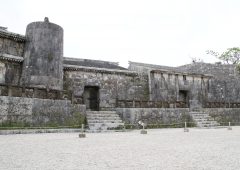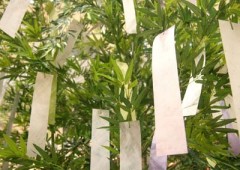2013.11.11
Hinukan watches over family fortunes

Hinukan is usually a simple arrangement of tea, rice, ash, a cup for awamori and a vessel to burn an incense stick a couple of times a month in some corner of the kitchen,
By Naomi Nakamatsu
Okinawa is more than just beautiful white sandy beaches, good food and tourist sites. There are many interesting customs, which are not written in a guidebook or easily seen by tourists and short-time visitors.
One such custom is the “Hi-nu-kan” or “God of Fire.” In homes, Hinukan is placed in the kitchen near the stove, and mostly taken care by the wife of the household. It is regarded as the protector of the family.
The wife would take care of Hinukan, and share with it any family event that would happen, such as a birth of a grandchild, and pray for the happiness of the family, for the abundance of grain, and prosperity of descendants.
On the daily basis, Hinukan is given a glass of water every morning and cleaned regularly. According to a local wife, “Hinukan is most happy when is being talked to.”
On every 1st and 15th of the month according to the Chinese calendar, a small ritual is held and Hinukan is given awamori, rice, an incense stick is burned and hands joined in prayer. And on Dec. 24th of the Chinese calendar Hinukan leaves the house to the heavens to notify the deities on the family matters of the year, and then returns back to the house January 4th.
Originally, Hinukan is believed to have been brought from the Chinese culture to Okinawa in the Ryukyu Kingdom era. The custom dates back to even before the introduction of the family altar at homes, another common custom that started in the 18th century. Hinukan has been the family’s protector and would silently look over the family ever since.
In modern times Hinukan is made of ceramics, but in the past, three small stones were chosen from a beach and placed in the the kitchen next to the kettle hole along with water, plants, and a small plate of salt.
This custom has continued for centuries, and varies slightly with every family. All customs are inherited from one generation to next with each family giving a unique and authentic taste to this ritual.
When a son or daughter gets married and moves out, they would be given some of the ashes from the stove, and start their own Hinukan. The fact that it continues over to the next generation may be the most important fact of this custom.
Although sadly, in today’s world the customs related to, and the role of Hinukan in the family life has been reduced for many reasons, it would be a great loss to have one more detail of Okinawa’s traditions to disappear altogether.

 2024.07.12
2024.07.12 2024.07.07
2024.07.07 2024.07.02
2024.07.02 2024.06.21
2024.06.21 2024.06.11
2024.06.11 2024.06.08
2024.06.08 2024.06.03
2024.06.03 2024.05.30
2024.05.30 2024.05.25
2024.05.25






